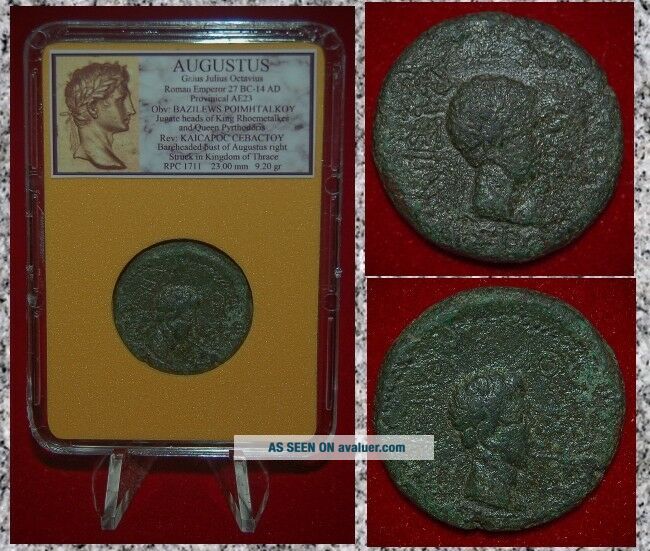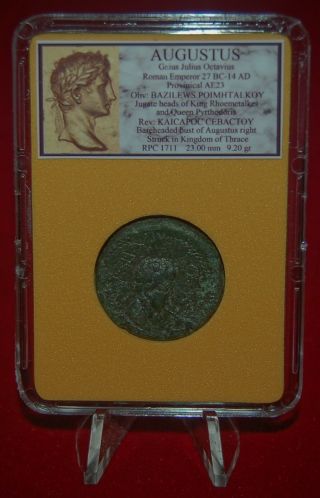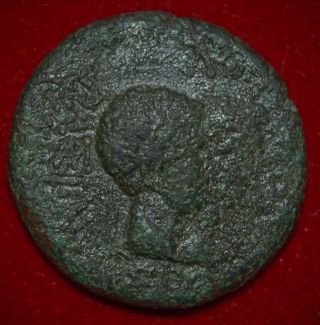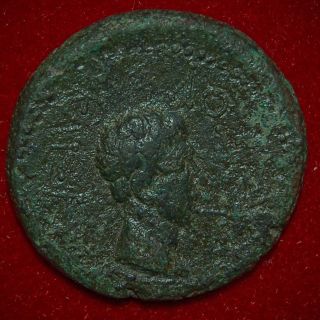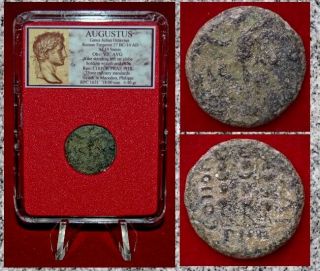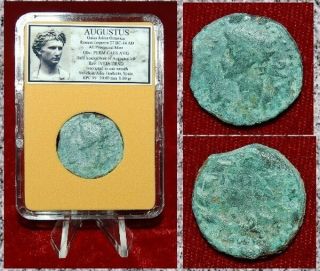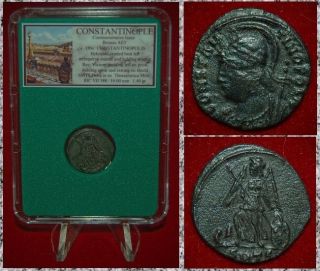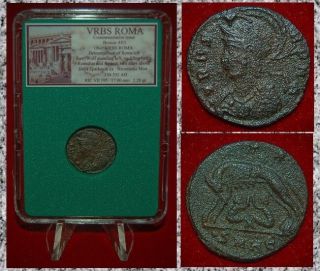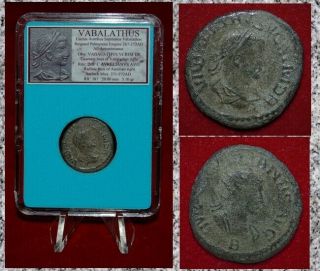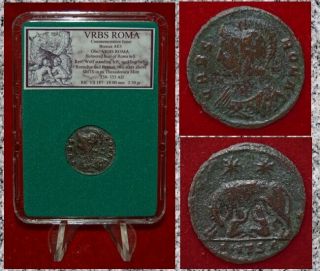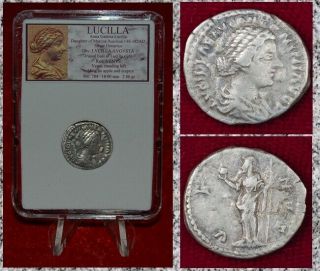Ancient Roman Empire Coin AUGUSTUS Bust Of Augustus And Rhoemetalkes Thrace
Item History & Price
| Reference Number: Avaluer:420390 | Ruler: Augustus |
ROMAN EMPIRE Ancient Coin AE 23 Provincial of AUGUSTUS Roman Emperor 27 B.C. -14 A.D. Obv: BAZILEWS POIMHTALKOY Jugate heads of King Rhoemetalke...s and Queen Pyrthodoris Rev: KAICAPOC CEBASTOY Bareheaded bust of Augustus right
23.00 mm
PRIVATE ANCIENT COINS COLLECTION SOUTH FLORIDA ESTATE SALE
( Please, check out other ancient coins we have available for sale. We are offering 1000+ ancient coins collection) ALL COINS ARE GENUINE LIFETIME GUARANTEEAND PROFESSIONALLY ATTRIBUTEDThe attribution label is printed on archival museum quality paper An interesting coin of Augustus struck in Thrace. Bust of Augustus and jugate heads of King Rhoemetalkes and Queen Pyrthodoris on reverse. This coin comes with free display case, easel and attribution label attached. A great way to display an ancient coins collection! You are welcome to ask any questions prior buying or bidding. We can ship it anywhere within continental U.S. for a flat rate of 6.90$. It includes shipping, delivery confirmation and packaging material.
Limited Time Offer:FREE SHIPPING(only within the continental U.S.)The residents of HI/AK/U.S. Territories and International bidders/buyers must contact us for the shipping quote before bidding/buying
AUGUSTUS The future emperor Augustus was born Gaius Octavius on September 23 63 BC. He was the great nephew of Julius Caesar.It is because of this close tie to Caesar that Octavian had many political connections in Rome.Caesar had favored the young Octavius from a very early age. In 48 BC , when he was 15 years old, Caesar enrolled Octavius in the priestly college of the Pontifaces and into the hereditary Patrician class in Rome. Octavius also joined Caesar on a military campaign in Spain on 46 BC. Later, Octavius was sent by Caesar to Apollonia , in Greece, to finish his education. During his time in Apollonia, Octavius trained with Roman Legions who were stationed there at the time. It was during his stay here that he had learned about Caesar's assination and that he was Caesar's adopted heir.
During his younger years, Octavius was always very pale, sickly and quite weak. There is a story that says , when he was just a young man, Octavius along with his good friend Marcus Agrippa went to visit the Sibyl of Cumae to hear what their futures would bring. Octavius believed that it was the strong Agrippa that was destined for greatness but when the Sibyl saw him, she bowed at his feet and said that he would be the next great leader. He did not believe that at the time but only a few short years later Caesar would be dead and Octavius would have the reigns of power thrust upon him.
Rise To Power
Octavius was eighteen years old and was living in Apollonia when the news of Caesar's assination reached him. His friends and family begged him to stay where he was and thought it best that he renounce his inheritance because the enemies and assassins of Caesar were very strong. Octavius did not take this advice and immediately announced his intentions of going to Rome to claim what was rightly his and to avenge Caesar's death.
Octavius displayed his deep understanding of the affairs of the government and he tried to make friends with the leaders of the Roman army. However, the important Mark Antony and Lepidus both viciously opposed Octavius's claim to power and fought him in a battle which they lost. After this first great victory, Octavius was made consul and decided that it would be best for all parties concerned that the three men should come to an understanding with one another to get vengeance on the assassins of Caesar. The joining of these powers was known as the Second Triumverant and in it the empire was divided as Octavius was to rule the West, Antony the East and Lepidus Africa.
Soon after the initiation of the triumverant, Octavius married a woman named Scribonia for political reasons. Scribonia was the relative of Sextus Pompey (the grandson of Pompey the Great).Regardless of the importance of this marriage, Octavius later divorced Scribonia in favor of the beautiful Livia Drusilla whom he lived with for the rest of his life. It is said that Octavius made the present husband of Livia , Tiberius Claudius Nero, divorce her and keep their two young sons under his custody. Scribonia had given birth to her daughter with Octavius , Julia, on the day that he and Livia would be married and it is said that he snatched the baby from her mother the moment she was born.
The two main goals of the triumverant were the consolidation of power and the vengeance of Caesar. Immediately following the initiation of the Triumverant, Rome witnessed a horrific spree of mass killings of the enemies of the three men. Among the great people killed was Cicero who was an enemy of Antony. However, the task of the triumverant was far from complete as Caesar's assassins , Brutus and Cassius, still lived. In 42 BC the armies of Octavius and Antony met those of Brutus and Cassius at Philippi where Brutus and Cassius were defeated and later killed themselves.
With the death of Brutus and Cassius, Octavius and Antony were strong enough to rule without Lepidus and so dropped him from the triumverant on the grounds that he was plotting against them. After this, Octavius stayed in Rome and Antony went back to the East. Things were now ready for the destiny that these two men would fulfill.
Upon returning to the East, Antony heard that Cleopatra , the queen of Egypt, had helped Cassius near the end of the war so he summoned her to Tarsus to answer to the charges. It is said that Cleopatra made great preparations for the trip and her arrival was that befitting of a queen. On her arrival, Antony invited her to dinner but Cleopatra believed that he should come to her and so out of courtesy and good will he did. Legend says that at this meeting Cleopatra used her seductive powers on Antony and he accompanied her back to Egypt.
It is very well known that the court of Cleopatra was very luxurious and that anyone could lose themselves in that luxury. Antony was no exception and he indulged himself so much that he even began to forget he was a Roman and he adopted Eastern habits and dress and even wore a diadem as if he were playing at being king. Cleopatra had great plans for Antony and herself which involved herself as Ruler of all the Mediterranean world and a great Egyptian empire based at Alexandria.She had once hoped to Rule as the queen of Caesar and even produced a son by him, Ptolomy Caesar or Caesarian, but she failed to succeed in her ambitions. Cleopatra saw the opportunity to be the queen of Antony and promised to help him with his fight against Octavius on the grounds that she rule alongside him.
Meanwhile Rome was in an uproar with Octavius doing everything he could to make Antony an enemy of the state. He tried to make the Senate agree to wage war against Egypt and Cleopatra. A few years before Octavius had married Antony to his sister Octavia and they had produced children together, but Antony had left her and went back to Cleopatra. There were also rumors in Rome that Antony and Cleopatra were preparing to wage a war against Rome.With this horrible case against Antony, the senate had no choice but to agree with Octavius and declare war on Egypt and Cleopatra.
The site of this monumental battle was Actium which was on the west coast of Greece. The Roman forces were led by Octavius's great general and friend , Marcus Agrippa, and the Egyptian forces were lead by Antony. The Egyptian fleet outnumbered that of the Romans, but were slow and heavily armed whereas the Roman ships were small and light. As a result, the Roman ships which were lesser in number defeated the Egyptian fleet commanded by Antony. Upon witnessing Antony's great defeat, Cleopatra fled to Alexandria and Antony followed her. Before he fled, Antony had in his control nineteen legions, twelve thousand horses , a huge navy, provinces with an abundant amount of resources and manpower and a beautiful capital , Alexandria, that rivaled Rome in all areas. When he followed Cleopatra, he lost all that.
The battle of Actium was the last stand of Antony and Cleopatra and the result of the battle saw the suicide of Antony and imprisonment of Cleopatra by Octavius. Instead of bearing the humiliation of being paraded in Rome by Octavius, Cleopatra killed herself by holding a poison asp up to her breast and letting it bite her.
Cleopatra was the last of the Ptolomys who had ruled Egypt since the death of Alexander the Great some 500 years before. With her death, Egypt became a province of the Roman empire and would be the personal property of all the emperors starting with Augustus.
Sole Rule of the Empire
Upon the death of Antony and Cleopatra, Octavius (now Augustus) arrived in Rome and celebrated a great triumph in which the people hailed him as Imperator. Upon his arrival, the doors of the temple of Janus were closed for the first time in 200 years and peace had finally been restored to the Roman Empire.
Upon his return to Rome, Augustus was given every high office by the senate and was essentially head of all the political and religious affairs of the Empire. After he retired from the Consulship he was given the rights that consuls usually only enjoyed. Also he was made proconsul over certain provinces and had authority over all provincial governors. Furthermore , the consuls were always in command of the Roman army so the proconsul had command of the provincial army. This meant that Augustus was the head of all the armies in the empire. With all these powers, Augustus was actually in total control of the empire but he did not want to make the same mistake Caesar did. To secure his power, he made it look like he was the "representative" of the senate as he had not gained these powers by force but had them given to him by the senate. Augustus took the title Princeps instead of using emperor or king right out which would have been very dangerous for him.
Augustus started out his lengthy reign by continuing many of the reforms started by Julius Caesar. One of his first acts was to continue the regulations for the distribution of corn begun under Caesar and he also improved the water supply of Rome. Augustus also instituted a fire brigade and made Rome's police force more efficient. His most famous civil change , however, was the institution of the Praetorian Guard who were his personal police force and that of most emperors who came after him. This select group of men numbered 3000 and were stationed all over Italy.
Augustus also had an extensive building program which helped to beautify Rome. Some of his more well known building projects were the construction of the Forum of Augustus, the Mausoleum of Augustus, the Theater of Marcellus and the baths of Agrippa. Also, he rebuilt many roads and temples.Augustus was dedicated to the beautification of Rome and was recorded to have said of himself "I found Rome a city of wood and left her a city of marble."
The most important reforms Augustus made involved how the provinces would be ruled. The problem was that Rome tried to Rule the provinces like she ruled herself but what works well with a small city state would not work well with a vast empire. It is because of this misrule during the last century of the republic that the provinces had suffered greatly due to wasted land and heavy taxation to fund Rome's many wars. As well, there had been a great deal of fighting within the provinces which led to barbarian invasions on the frontier towns.
To remedy the problem with the provinces, Augustus first divided them into two classes. In his division, the older provinces were kept under the control of the senate but the newer provinces or ones which were on the frontiers were put under his control. This division worked well for Augustus in all ways since the senate had given him some power in all provinces.He even had power in the provinces ruled by the senate. These reforms of Augustus resulted in better and more honest governing of the provinces because it was no longer possible for the governors to misgovern them.Any governor who did misgovern was responsible to Augustus or the senate and was immediately called to Rome to be punished.
Augustus was also a firm believer that the empire was as large it could possibly be for it to be governed justly, and so had no real ambitions of conquest. He believed that his job was to unify all the different societies into one that was loyal to only Rome. In order for this peace to occur, the frontiers must be secured and Augustus believed that natural barriers would be the easiest and most effective security. The Roman empire was so large that it did include many such natural barriers. It extended to the East to the Euphrates, in the west to the Atlantic Ocean and on the South by the great African desert. It was only in the North and North East that there were problems with the boundaries.
The Rhine and Danube rivers made up the North and North Eastern boundaries of the empire respectivly. These rivers may have been natural boundaries in a sense but beyond them there lived swarms of Germanic tribes. Augustus believed that a better boundary would be the Elbe river which was closer to the barbarians and so made a successful conquest of the area.To govern the newly conquered territory he chose a man named Quintus Varus who turned out to be involved in one of the greatest defeats of Augustus' career.What happened was that the Germanic Tribes rose in rebellion against the Roman government and a fierce battle ensued in which the Romans suffered a miserable defeat.Varus later killed himself as he believed it would be better to die than survive such a horrible humiliation.Augustus , upon hearing of this great disaster, is said to have yelled "Varus, Varus give me back my legions." After this horrible defeat, Augustus now firmly believed that the Northern boundaries should stop at the Rhine and Danube.
By the year 17 BC Augustus had been ruling Rome for 17 years and Rome was at the height of her power. To celebrate his great successes, Augustus ordered that there should be public game celebrated. These games were very special and were known as the Secular Games which comes from the latin word meaning "end of a period" .These games were first celebrated when the republic was young because of the end of a horrible pestilance. It was believed that these games brought as purifying effect to the state and were celebrated whenever such purification was deemed necessary. These games lasted for the last three days of May and the first three days of June and during that time offerings were made to the gods by the people of Rome, including Augustus.
To further his power even more, Augustus became Pontifex maximus in 12 BC and was later named "father of his country " in 2 BC.
The Final Years
Tragedy and sorrow played a big part in the final years of this great man. His only daughter, Julia, was a known harlot and went behind her fathers back many times and had numerous affairs with many prominent and esteemed men. It is said that she had slept with half of Rome and Augustus had not a clue of what she was doing. When he did find out about her horrible debaucheries, he had her exiled to a small rocky island called Pandonia. Also, after the exile of Julia, Augustus had the misfortune of losing his three grandsons by by Julia and Agrippa when they were married.Augustus had planned for one of these three boys to succeed him but instead had to rely on Tiberius, the son of Livia as his heir. Augustus had never been very fond of Tiberius and he was Augustus' last choice as heir.
In the year 14 AD Augustus died after a sudden illness. He had reigned for an astounding forty years and when he died Rome was at the height of its prosperity. Augustus ushered in a time of peace in the Roman Empire called the Pax Romana( or Roman Peace) that would last for 200 years and a stable system of rule that would also endure for over four hundred years. The succession was quick and well planned out and Tiberius quietly became the second Roman emperor.
SHIPPING INFO: - The Shipping Charge is a flat rate and it includes postage, delivery confirmation, insurance up to the value (if specified), shipping box (from 0.99$ to 5.99$ depends on a size) and packaging material (bubble wrap, wrapping paper, foam if needed)
- We can ship this item to all continental states. Please, contact us for shipping charges to Hawaii and Alaska.
- We can make special delivery arrangements to Canada, Australia and Western Europe.
- USPS (United States Postal Service) is the courier used for ALL shipping.
- Delivery confirmation is included in all U.S. shipping charges. (No Exceptions)
CONTACT/PAYMENT INFO:
- We will reply to questions & comments as quickly as we possibly can, usually within a day.
- Please ask any questions prior to placing bids.
- Acceptable form of payment is PayPal
REFUND INFO:
- All items we list are guaranteed authentic or your money back.
- Please note that slight variations in color are to be expected due to camera, computer screen and color pixels and is not a qualification for refund.
- Shipping fees are not refunded.
FEEDBACK INFO:
- Feedback is a critical issue to both buyers and sellers on eBay.
- If you have a problem with your item please refrain from leaving negative or neutral feedback until you have made contact and given a fair chance to rectify the situation.
- As always, every effort is made to ensure that your shopping experience meets or exceeds your expectations.
- Feedback is an important aspect of eBay. Your positive feedback is greatly appreciated!
. href="https://www.auctiva.com/?how=imgLnk2" target="_blank">
. href="https://www.auctiva.com?how=credLnk1" target="_blank">



